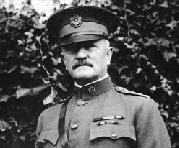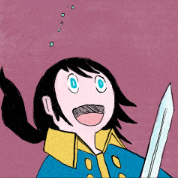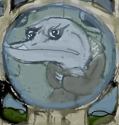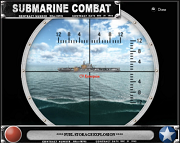|
The rosy light of dawn has not yet crept over the horizon, but in the quiet hours before daybreak there is furious activity aboard ship. Plans have been drawn up through the night, maps consulted, calculations and estimates made, plotting tables turned into battlegrounds across which firm and passionate arguments are fought. Finally the time is here. The vessel turns until the wind is blowing straight down its length, its engines at their maximum output, and its deck becomes a stage. Teams of men hurry to do their duty without stepping on one another, a choreographed act which amounts to the coiling of a colossal spring. Warplanes are raised from the belly of the ship by the tireless, groaning work of pumping elevators. The planes, painted in soft blue-gray colors that reduce their outlines to mere smudges when seen against the ocean, unfurl their wings and shake the tiredness from their mechanical limbs. They hunger for fuel and ammunition, and are sated, for a time, by the attention of men with hoses full of acrid gasoline and belts of fat machine-gun rounds. The sturdy metal shapes of bombs and torpedoes are clamped snugly to their undersides. In turn, each plane is steered into place. Pilots, strapped into their seats, have a moment to prepare themselves with invocations of God or families back at home. Then, the instant arrives when preparation ends and action begins. The order is given--”Launch!” Our story begins some time before that.   It is January 1900, and the world is, mostly, at peace. The major nations have not clashed since the awful disaster of 1871 that saw Alsace and Moselle fall out of French hands. Perhaps that peace will last. Perhaps not. This is an age of empire, of great colonial powers stretching out their hand to scoop up vast swaths of land. From every corner of the globe, wealth and tribute flow to the capitals of Europe. America, fresh from its settling of the West, has gained overseas colonies of its own in the Pacific. Japan, determined not to be left out, is planting its flag across Asia. This is an age of steam and iron. For if great riches are to be wrested from the bosoms of faraway nations and brought home, they must enjoy safe waters. Every great power has a navy, and each has its role to play in its nation’s greatness.  At present, the Marine Nationale of the Third Republic possesses seven battleships, all of the Ocean class, two armored cruisers of the Dupetit-Thouars class, three protected cruisers of the Sfax class, and finally, sixteen torpedo-boat destroyers, mostly of the Espingole class, with three older Baliste-class ships still around.  Three ships are still under construction--two of the new Richelieu class, which are broadly similar to the Ocean-class ships save for carrying their secondary armament in turrets instead of casemates, and a unique protected cruiser called Forbin. It must decide what to do with them. A quick look at the current edition of Flottes de combat, the finest available chronicle of naval matters, shows how France compares to the other great navies of the world.  In the fall of 1899, amid preparations for the end-of-the-century celebrations, France called a multi-day meeting of its naval officials, both civilian and military. It was a time of great promise, and factions within the government seized the opportunity to argue their agendas. The men who convened in the luxurious halls and salons of the naval headquarters at the Hôtel de la Marine came armed with facts, figures, and illustrations from every corner of the globe with which to buttress their arguments, and the discussion ranged over subjects from breadfruit crops in Polynesia to weather patterns in the North Atlantic. In particular, however, people focused on three main topics that would affect France’s naval and foreign policy for years to come.  Foreign Affairs: Should France act aggressively or defensively? France has no shortage of nations against which it might hold a grudge. Bellicose officers within the admiralty push for hardline diplomacy and a strong face to the rest of the world. When our national pride is at stake, it must be upheld, even if the blood of Frenchmen is the necessary price. The Navy should be prepared to be used, to try itself against the ships and sailors of other nations, and to emerge victorious through strength of arms and superior fighting spirit. To that end, we should plan for offensive operations in the event of a war at sea. (if you choose this option, you can also identify a specific nation we should take a hard line against) At the same time, a more moderate course can pay dividends without risking too much. The less headstrong among the nation's leaders believe that France should continue to build a strong navy, but as much in order to avoid war as to fight it. In addition, defensive shore emplacements can be built at strategic locations to ensure the security of our existing possessions. France will not shy from a fight if one comes to her, but she need not seek one out. Military Priorities: Where will a war be fought? When it comes to the subject of a hypothetical next war, some advocate a full focus on European affairs even at the expense of the colonies. If war is to come, they say, it will come at home! The most likely enemies are Germany, Italy, or Austria. As such, French capital ships do not need large coal bunkers and luxurious quarters to be useful. A large fleet of compact but powerful ships will ensure France’s dominance in waters close to home. Some more expansive thinkers push for France to take its role as a world power to heart. No waters on Earth are beyond her reach! Colonies are important to both the economy and to national prestige. The fleet, in their eyes, must be able to operate around the world, even if that makes its ships and upkeep more expensive. They also suggest that a strong squadron be maintained in Southeast Asia to show the flag in our Indochinese colonies. Naval Strategy: How will a war be fought? A certain amount of innovation is already characteristic of French naval construction, but the Marine Nationale has not forgotten the importance of the battleship. Leadership is presently divided about the ideal naval doctrine. War is both an art and an science, and neither aspect of it is easy to master. The traditionalists hold that the battleship is still the king of the seas. Under their plans, France will spare money from battleship construction only for the light ships necessary to screen the battle-line. In battle, the main objective will be to bring the heavy ships into position to fire their broadsides. Bigger guns and heavier armor must receive a bigger share of the research funding. The Young School, on the other hand, views light ships and torpedo warfare as the future of the Navy. They want to invest in a large number of inexpensive but capable smaller ships that, it’s claimed, could dash in under the enemy’s guns and quickly devastate their battle-line. At the same time, they support building fast, long-ranged raiding ships with which to bring the war to enemy commerce. This is a view of naval conflict focused on industry and efficiency: strangle the enemy’s trade and destroy his battleships with new, innovative weapons of war. The conclusion of these arguments will be of great importance for the future of the French Navy and indeed France itself. Which sides won out? Voting closes at 9am US Eastern Time on Saturday, June 1st. To make this easier, please render votes in the format of: example posted:hardline European traditionalist or second example posted:moderate colonies Young School
|
|
|
|

|
| # ? Jun 9, 2024 01:24 |
|
BOOGITY BOOGITY BOOGITY LET'S RULE SOME WAVES BOYS AND GIRLS Table of Contents Part 0.5: Navies of the World in 1900 Part 1: January 1900-June 1901 Part 2: July 1901-March 1902 Part 3: The first battle of the Austro-French War of 1902 Part 4: The Austro-French War, Part 1--May-August 1902 Part 5: The Austro-French War, Part 2--September-December 1902 Part 6: The Austro-French War, Part 3--January-November 1903 Part 7: November 1903-February 1905 Part 8: February 1905-October 1906, including the Second Austro-French War Part 9: October 1906-April 1908 Part 10: April 1908-March 1910 Part 11: March 1910-September 1911 Part 12: October 1911-January 1912 Part 13: February 1912-May 1912 Pirate Radar fucked around with this message at 06:56 on Aug 18, 2019 |
|
|
|
I'm a hardline colonial Young School-er. Without our colonies we're just Italy with better wine.
|
|
|
|
Moderate European Young School jeune école européenne modérée Ignore the rest of the world, seize what we need in the Med, especially smash Italy and Austria-Hungary. Only then can we reclaim what Napoleon III lost.
|
|
|
|
|
I vote for Hardline European Young School , but obviously we'll still need some big ships for the Marine Nationale. Maybe just a couple of designs for BBs, CVs, CAs and such...? I'm following both your and Grey Hunter's LPs on Rule The Waves 2, and I can't wait to see you bring victory to France!
|
|
|
|
Moderate European Traditionalist (What mode is this on?)
|
|
|
|
Hardline (against Italy) European traditionalist. The upstart Italians have been angling for their own empire, even though anyone can see North Africa is in France's sphere of influence. Let's put some pressure on the Triple Alliance. I'm sure Russia will have our backs if things get out of hand.
|
|
|
|
I'm a moderate European new schooler, let's torpedo some Med boats - responsibly
|
|
|
|
Moderate colonial traditionalist. For now, France should maintain and strength her existing colonies and fleets. This will allow her to respond to world events from a position of strength.
|
|
|
|
Hardline European traditionalist.
|
|
|
|
Young School is better in the early game, those battleships aren't worth a drat.
|
|
|
|
What would focusing on proto-BC CA's, Minimalist Raider CL's and DD's be?
|
|
|
|
Moderate colonial traditionalist, our battleships shall be second to none!
|
|
|
|
Arglebargle III posted:Young School is better in the early game, those battleships aren't worth a drat. who cares, this is a matter of national pride! Hardline European traditionalist. lets beat up Italy
|
|
|
|
Arglebargle III posted:Young School is better in the early game, those battleships aren't worth a drat. It doesn't matter if they're any good or not! It just matters that we have more of them. That's what global respect is all about.  Let us fill the Mediterranean from end to end with giant, impractical hunks of floating metal, and all the world shall be in awe. Let us fill the Mediterranean from end to end with giant, impractical hunks of floating metal, and all the world shall be in awe.
|
|
|
|
hardline European young school
Infidelicious fucked around with this message at 18:12 on May 31, 2019 |
|
|
|
Yooper posted:jeune école européenne modérée let le rosbifs waste their colonial treasure on oversized iron deathtraps, the way of the Republic is élan!
|
|
|
|
OddObserver posted:Moderate European Traditionalist This is playing with historical resources on and Very Large fleets. Historical resources were broken (the button didn't do anything) until the 1.02 patch.
|
|
|
|
Hardline European Traditionalist 
|
|
|
|
Moderate European Young School However, we should also work to befriend the USA. Keeping the Atlantic peaceful is in everyone's best interest.
|
|
|
|
Hardline European Traditionalist The Battle Line has served the world for well over five hundred years! The British defeated the valiant Napoleon at Trafalgar with one a century ago. A mighty line of warships from the era of sail back to that of ones manned by oars of the Romans and Egyptians fighting one another in the Mediterranean, the Greeks and the Persians.. We have been served throughout history in varying forms by ships of greater power and strength lining up to fight one another in honorable combat. France shall not impugn her strength, her virtue, her HONOR by using such trites as 'torpedoes' and 'these things which float like little tubes in the water'. France shall fight with ELAN and MIGHT!
|
|
|
|
Hardline European Traditionalists Messieurs, do not forget that we have been embarrassed not in the colonies, but upon our own homeland, by the hated boche. We will put up a thick wall of steel to protect our trade and colonies from our colonial rivals right here in Europe, and it will not be a little wall of steel. Je veux que le kaiser pleure en admirant le diamètre de nos cannons!
|
|
|
|
 Contre-Amiral Jean-Claude Yves Francois Pierre Marie Bacarrette is a Hardline European of the Young School. Revenge for 1871! Germany will pay! Revenge for Italian treachery! Italy shall not have Africa! And these new developments with torpedoes are quite fascinating...
|
|
|
|
Hardline Colonialist of the Jeune Ecole Frenchmen will always win if they fight with elan. Lumbering battleships with crews cowering behind armor plates give little opportunity to display a proper aggressive spirit. Ships with little armour but speed will give our officers little choice but to engage aggressively and defeat the enemy swiftly. The Lone Badger fucked around with this message at 11:27 on May 31, 2019 |
|
|
|
jeune école européenne modérée Mes Amis, our principal rivals are no longer the British, but the Germans. We should seek alliances to safeguard us from the expansionistic tendencies of these brutes.
|
|
|
|
Infidelicious posted:What would focusing on proto-BC CA's, Minimalist Raider CL's and DD's be? Sorry, didn't see this before. I'm happy to call that kind of thing Young School, since it would give us a fleet that would disrupt the enemy's trade and be able to pick and choose when to engage their main strength.
|
|
|
|
moderate European traditionlist We can make our own Jutland! Better! Frencher!
|
|
|
|
Total Hardline European Jeune Ecole Now there's no reason to stay away from the colonies, but the colonies doesn't require unnecessary luxuries like non-cramped accommodation or frivolous fuel tanks. Especially not when the enemy sits right across the channel mon ami. We won't have to search for him sire!
|
|
|
|
 Jean-Louis Tropconfiant, self styled "Le loup de Mer" at a costume party, c. 1900 Mesdames et Messieurs, I am so glad to be here at the dawn of a new century, a French century, that shall see the Gallic Cock spread itself across the entire globe! With a hardline taken against those who seek to damage the metropole by attacking our God-given colonies (especially Perfidious Albion), we must not only show our strength but our globe-spanning reach, and as a member of the Young School I know precisely how we can manage that.
|
|
|
|
Moderate Colonial Young School Let us move steadily towards the future, in which France shall go to the world, and in turn the world shall come to us.
|
|
|
|
Soft warning (do people like having these? would it be better do this earlier?) for voting closing in about four hours. Right now there's a preference for hardline diplomacy, a focus on Europe, and the adoption of the Young School's ideas about naval warfare--in this, as in all future votes, I will take note of how close the voting is, so your votes should always matter even if you lose. For a better look at the state of the world in 1900, here's the map at 2k size:  It's divided into sea zones, the names of which can be seen at left. And here's something new in RtW2: the "Area Overview" tab.  From left to right this shows us how the name of each zone, how many possessions we have, our base capacity (this can be improved), our current strength, our current tonnage, and the tonnage required (minelaying and minesweeping will come up later). Everywhere you see a flag (or a grey square) on the map is either a home area or a colonial possession. The two flags on France itself represent our home areas, Western France (in Northern Europe) and Southern France (in the Mediterranean). Western France is our build area and will be where any new ships we build appear. Every other French flag represents one of our colonial possessions (yes, Corsica counts). Possessions outside of Europe usually require work to maintain, and we'll need to keep ships stationed there at all times in order to keep a hold on them. In return, they contribute to our national income. You can see that we must maintain 4,000 tons each in West Africa, the Indian Ocean, and the South Pacific, and 17,000 tons in Southeast Asia, where our most valuable possessions are located. We have no tonnage requirement in the Caribbean because the Antilles are too small to require a permanent naval presence. Within each possession there are a variable number of ports (at least 1). In South-East Asia, for instance:  -Fort Bayard is the port at Kwang-Chou-Wan Today this is the city of Zhanjiang in Guangdong Province, PRC -Haiphong and Than Hoa are the ports in Tonkin (North Vietnam) -Cam Ranh Bay and Da Nang are the ports in Annam (sort of south-central Vietnam) -Saint Jacques is the port in Cochin China (south Vietnam) Today this city is called Vũng Tàu
|
|
|
|
Voting is closed, an update will follow. The Hardline and European factions won out in the debate and though it was a narrow thing the Young School did as well. While I work on the first update, here's a rundown of the state of the world's navies: Flottes de Combat, 1900 Edition: The Fighting Navies of the World What follows is a selection of entries discussing the world’s naval powers in January 1900: The Royal Navy Queen Victoria’s loyal fleet contains eighty-one warships, ranging in size from the 400-ton Derwent class of torpedo-boat destroyers to the 15,500-ton Renown and her sister ship Revenge.  The Renown class is a prime example of the current standard for the world’s battleships: one large turret at each end and a strong broadside of quick-firing guns in between. They make 18 knots at full steam and are sufficiently armored to effectively resist any enemy shells. They also bear two torpedo tubes on each side, though these cannot be used at full speed. A unique battleship, the HMS Hood, is under construction, in addition to two ships of the new Redoubtable class, the name-ship and its sister Majestic. Our intelligence services have not yet learned the specifications of the newcomers, but they may inform us more about them in the future. The British armored cruiser fleet is comprised of the Diadem, Amphitrite, and Aboukir classes, with the Diadems being the most numerous of these.  The Diadems are less heavily armed than most armored cruisers, with a main battery of only 6” guns. The Deuxième Bureau is divided about their top speed, with some saying the class is capable of 23 knots while others maintain that such a speed is impossible for a ship of their size.  The Amphitrite and its sister Spartiate are more typical of the world’s armored cruisers, with a main battery of 9” guns and a secondary battery identical to that of a Renown-class battleship, a signal of the British Admiralty’s vision for these ships: smaller versions of battleships, fit for duties that require something more forceful than a 6” gun but do not yet require the attention of a battleship. They are also quite fast at either 22 or 23 knots--again there is disagreement within our naval intelligence about their true capabilities. The United States Navy The American Navy’s battlefleet seems to be built in imitation of the Royal Navy’s ships. Its Delaware and Nevada class battleships are broadly similar to the Renown class and the American Brooklyn-class armored cruisers are almost exact copies of the Diadem. America currently has the world’s smallest destroyer fleet, with only 15 hulls in the water, but is pursuing a significant expansion, with 10 destroyers under construction. Most of the current fleet is the 400-ton Chauncey class:  With four of the newer Hopkins class:  The Imperial German Reichsmarine Lagging behind the other Northern European navies, Wilhelm's fleet only fields five battleships, all of the Wörth class.  This ships eschew the heavier batteries of other nations’ battleships in exchange for a heavier throw-weight from its quick-firing secondaries, with a broadside of nine 15cm secondary guns per side. Germany’s armored cruisers are similar to the British Amphitrite, and its protected cruisers are generally small, with a standard speed of 21 knots, bristling with 10cm guns. The Kaiserliche und Königliche Marine Austria-Hungary, with a relatively small coastline and no overseas possessions, has put less of a focus on its navy than other nations. Its four Monarch-class battleships are closer to armored cruisers than they are to usual battleship standards. Its Kaiserin und Königinin Maria Theresa class of armored cruisers is unusual, however:  Notice that the main battery is carried in single turrets. As with other Austrian ships they are smaller than their foreign counterparts. The Regia Marina Pound-for-pound, Italy’s navy is a formidable thing. Each of the four Regina Margheritas is the equal of the British Renowns:  The Italian cruiser fleet, meanwhile, is relatively small. We will keep an eye on Rome’s future naval spending and remain apprised of any new developments. The Imperial Japanese Navy While for other powers the Pacific is a faraway theater, there is one for whom it is very close to home: Japan. The Japanese navy fields less tonnage than most others (save perhaps for Austria-Hungary), but all of it is concentrated in the Asian sea areas. Of note is the unusual Izumo class:  Unlike other cruisers it has four rotating turrets in a diamond shape. While this gives the guns a wide range of fire, the ship cannot concentrate any more than six guns on any one target. For the interested, an unsorted collection of pictures of all the current ship designs is here: https://imgur.com/a/D2Wo55O
|
|
|
|
There is a distressing sameness to these designs that I hope we can weird up.
|
|
|
|
Pirate Radar posted:And here's something new in RtW2: the "Area Overview" tab. Mother... FUCKER. I’ve played two games into the thirties and somehow overlooked this. Serious QoL improvement.
|
|
|
|
 JANUARY 1900 Some adjustments are made to French naval spending to start the new year. Namely, intelligence is tasked with examining foreign nations, particularly Germany and Italy, our close rivals. Research funding is increased as a share of the naval budget, and the Young School’s influence makes sure that some areas are better-funded than others.  Some ships are put into the reserve in order to save money, though our forces are first redistributed in order to better cover our coast--in an oversight, no ships had been assigned to the Mediterranean. The error is fixed. All that being done, we make our budget projection for the year:  We can clearly afford more of an outlay--and we are eager to spend what we can. Another of the Forbin class is laid down at the Loire shipyards. In addition, we start the construction of several new coastal batteries in the Mediterranean, protecting some of our holdings there. These batteries are cost money, but once built they cost less upkeep than a comparably armed ship would, and obviously cannot be sunk. Conflicts abroad could either help or hinder European peace. In China, the so-called “Boxers”, anti-Christian zealots, are escalating their violence against foreign representatives in Beijing’s Legation Quarter, and the Empress Dowager has seemed reluctant to rein them in. In southern Africa, the ongoing tensions between the Dutch-speaking Boers and English-speaking British have already broken out into war.  Boer soldiers at the siege of Mafeking FEBRUARY 1900  Some new ships are laid down abroad. Going forward I’m not necessarily going to cover every turn report. This is what they look like, though. MARCH 1900  Things continue as they were. APRIL 1900 I forgot to screenshot the turn screen In April, however, a sudden crisis crops up between ourselves and Britain. Relations across the Channel had been positive, but following newspaper reports of harsh treatment of Boer settlers by British soldiers cracking down on the rebellion, public opinion in France begins to turn against the Brits.  At the same time, matters in China have further deteriorated. We have formed an international force along with seven other nations and dispatched thousands of soldiers to Tientsin, near Peking, to safeguard the international legations there. MAY 1900  Our intelligence service reports a small gift: the plans for the newest Austrian battleship, the Radetzky. Unfortunately this is not a significant achievement, as the Radetzky is another of the Monarch class, already known to us.  The woman in the picture is Mata Hari, exotic dancer and real-life WWI spy. The Prime Minister expresses concern about our strength in Northern Europe given the increased tensions with Britain, but public opinion has had time to cool off and the matter is quickly forgotten. Sometimes tension just does this. It basically went back to normal the next turn. JUNE 1900  The US finishes several destroyers. In China, the Boxers have laid siege to the foreign quarters of Peking, though they do not storm the walls. The Empress Dowager has declared her support for the anti-European forces. JULY 1900  Some of the coastal batteries we ordered earlier finish construction. The Eight-Nation Alliance, as it’s being called, arrives in China and battles Boxer forces near Tientsin before beginning a march on Peking. AUGUST 1900 We have enough money saved up to begin a new design study. Following the heightened tensions with Britain, the mind of the Navy is turned to disrupting enemy trade lanes. For this we will need a fast cruiser with large coal bunkers. Now we open the ship design window:  Hmm, looks familiar enough. But wait, what’s this?  That’s more like it! As you can tell the ship design system has been expanded. Most of the stuff on the right side, however, won’t come up yet. The Cosmao class of protected cruisers is designed with trade interception in mind. Long range and high speed will let it pick and choose its engagements. It only needs light armor and a few guns to complete its mission of preying on unarmored freighters. The design study is commissioned on these parameters. I actually made a mistake and overlooked the main guns here; I’d meant to only make them 5” rather than 6”. It won’t affect much, though, since having long range in the first place takes up a lot of weight. Because of the way the ship design algorithm works, we could make this 2100 tons if we changed the range to medium and shed some armor, but then the game kept telling me it was actually a DD. Meanwhile, in Peking...  The Empress Dowager and her court are reported to have fled the ancient city before the arrival of the international forces. Any reports of looting and pillaging by French troops should be understood to be greatly exaggerated. SEPTEMBER 1900  OCTOBER 1900  The design study for the Cosmao class finishes, and two are ordered. At the same time, the Forbin finishes construction and is commissioned into the navy. She will spend some time working up before joining the active fleet.  Our scientists are hard at work, but report some kind of trouble. We’ll check back later and see how they’re doing. NOVEMBER 1900 It was a moonless night with late autumn’s chill in the air. Mercier stepped lightly up onto the train, entering the sixth of its carriages. Around him, the cavernous station was dark and nearly empty. Far underneath the Gare du Nord’s high, angular roof, the big, squat locomotive was warmly hissing steam. Behind it, firmly grasped by steel couplings, were a row of cars so dark blue they looked black where they were not touched by the glow of the lamps. Inside the carriages the aisle was dark as well, lit only by the glow of the kerosene lights at each end. Mercier stopped by one of them and drew a card out of his jacket’s inside pocket, holding it up to the light. He tilted his head, checking the name and number once more, then, satisfied, put it away. He moved down the passageway, counting the doors of the compartments as he passed them. In front of him, one opened before he could reach it. Mercier frowned slightly. Not the right door, but who would be stepping out at this hour? The man who exited the compartment was still tucking in his shirt when he came into the passageway. He was a jowled man with wispy hair brushed lazily over his head--reasonable, Mercier thought, given the time. He moved to one side to prepare to step around the passenger. “Ah, pardon, pardon,” the stranger said in English, his voice bearing what Mercier thought was a London accent. Mercier’s own English was not precisely fluent, though he understood enough of it to do his job. “Just on my way to the loo.” Of course. The sleeper train had started in Calais, and most of the passengers who had boarded there were English, just off the boat coming across the Channel. It was only meant to stop in Paris long enough to take on some additional passengers. Mercier smiled and gestured outside, attempting to contain within a gesture the complicated thought Monsieur, please do not use the train’s own toilets while the train is in the station. “Right, thanks--ah, merci.” the Englishman said, sliding past him towards the door. “It is no problem, sir,” Mercier said, turning back down the passageway. He stepped briskly down the hall, resuming his mental count. 35, 34, 33… 32. He paused a moment and looked over his shoulder. Behind him, the Englishman climbed down the steps and disappeared off into the dimness of the station beyond in search of the loo. Mercier knocked three times on the door of compartment 32 and waited, listening for sounds from within. There was a small bump which he guessed was the sound of feet hitting the floor. He stood, impassive, a few more moments. The door swung open to reveal a spectacled man with a neatly trimmed mustache. His brow was furrowed even before he focused his eyes on Mercier. “Hello?” the man said in clear but slightly accented French. Behind him, Mercier could see the compartment, dimly lit, with the bed disturbed and a large suitcase sitting on the floor. “Please excuse me, sir. We had a report of noise.” Mercier responded. He smiled thinly. “Have you heard anything?” “Noise?” The man seemed taken aback. “No, I have heard nothing. Are you a conductor?” “I am a railway inspector, sir.” Mercier patted his breast pocket, where a badge might be kept. He often found that the gesture was enough to satisfy people even without actually showing them anything. “May I see your traveling papers?” “My papers--” the man said, seeming for a moment like he might lodge an objection before cutting himself off. “Surely,” he said after a short pause, “you may, inspector. But I have heard no noise.” The man turned and lifted his jacket off the compartment’s coat-hook. From one of the inside pockets he withdrew a passport with a train ticket tucked inside it, offering them both to Mercier. He now wore a sullen frown, and for a moment, his eyes flicked outside, glancing at the dark station platform. “Thank you, sir. I apologize--my eyes need better light than this. Could you do me the favor of turning up the lamp, Mr…?” Still frowning, the man reached out and turned the knob of the compartment’s lamp until the room was glowing with light. Mercier opened the passport and looked inside. Giancarlo Silvi, it read. The same as the name on the card in his pocket. He closed the passport and handed it back, still smiling. “Thank you, Mr. Silvi. That will be all.” Silvi blinked a few times, confused. “Well, Mr. Inspector, I hope you have a pleasant night.” “I believe I will.” Mercier replied, reaching into his pocket. This time did produce a badge, one of the counter-intelligence office of the Sûreté. “Now, please hand over the other papers. The ones inside your suitcase.” Silvi’s face blanched. Later, when the blue-uniformed officers Mercier summoned from out of the darkness were marching Silvi away, the Englishman returned from his trip to the facilities. “What’s all this, then?” he muttered as he passed, watching the protesting Italian cursing and struggling against the policemen’s grip while he was bundled away to a waiting vehicle. Mercier turned and smiled. “No ticket.”  The news of an Italian spy’s arrest fills the papers for days! Much is made of the devious Italian’s efforts to learn details about our newest cruisers, and the National Assembly issues a statement publicly condemning Italy for its attempted espionage. DECEMBER 1900  With tensions therefore raised between Paris and Rome, and the earlier trouble between us and Britain, the Prime Minister expresses concern while meeting with the naval staff at the end of the year. He is assured that the Navy will guarantee France’s victory if war comes, so long as it is properly funded.  JANUARY 1901  Britain increases its spending to stay ahead of others, as it usually does. We calculate another yearly budget. We have more money to spend this year.  The Forbin finishes her working up and is assigned to the Atlantic Fleet.  We implement new ideas about machinery. A lot of techs are just incremental improvements in something or other. This one makes engines weigh less. FEBRUARY 1901  The Boer War has turned against the Afrikaaners, who have turned to harassment tactics and raiding in order to combat the British Army’s conventional strength. A revolt breaks out elsewhere in Africa as well: Zanzibar.  Some agents of the Deuxieme Bureau write up a plan suggesting that we secretly supply weapons to the rebels there in order to strengthen their resistance. This is given serious consideration, but ultimately, out of fear that rebellion in one part of Africa will encourage more elsewhere, we decide not to get involved. Additionally, another ship of the Cosmao class is laid down, and the Magenta is commissioned into the Navy. MARCH 1901  World naval budgets continue to grow.  At home, however, the National Assembly is arguing that the naval budget does not need to be so high. Their deliberations are interrupted by urgent news: another Italian spy has been caught by agents of the Sûreté’s counter-intelligence section!  Again the papers fill with agitation over this news. Despite these, tension with Italy isn’t really that high. Sometimes it’s hard to pick fights in this game. Also, the “tensions low” event and the “spy caught” event cancel out each other’s effects on the budget. Additionally, a new class of destroyers is planned--we are thought to be lacking in numbers here, and putting more torpedo tubes to sea is a key part of our new naval strategy.  APRIL 1901 Several important research breakthroughs are made in April.   Torpedoes in Rule the Waves can be launched at two speed settings, and have different ranges. Our ships will automatically pick what they think is the best one. With the design study of the Arquebuse class complete, we order six of them. We also turn our attention to armored cruisers. In particular, some of the heavier designs of foreign navies could be a clear threat to our cruisers. We should not allow this! An armored cruiser with 10” guns and a speed of 23 knots sounds like an extravagance, but such a design is requested and detailed work begun.  MAY 1901 Richelieu comes out of the yards and is commissioned. More importantly, we reach a breakthrough in torpedo-boat design!  Another new study is commissioned using this information:  JUNE 1901 There is talk among the diplomats of an easing of relations with Austria-Hungary, but the naval staff dismiss the idea out of hand. Austria is an old, sick empire with a weak navy. We have nothing to gain by giving in to them!  Six more destroyers, this time of the Fronde class, are ordered.  In the middle of 1901, this is how tensions stand; they’re highest with Austria-Hungary  And this is how we currently stack up to the other navies of the world. This has gotten long enough so I’m gonna leave it at 1.5 years. I think that’s a good amount of time per update for things like this; the length might change if other interesting stuff starts to happen. I'll aim to get another update out sometime this coming week, my schedule permitting.
|
|
|
|
A war with Austria-Hungary might be the best thing to raise our budget and prestige. They are among the weakest nation, and are quite easy to blockade (free VPs). I think the lenght is good too, and you're doing a good job at telling your story and including historical tidbits in it. Great job, I'm looking forward to the next part!
|
|
|
|
Thanks! Most of the playing for the next update is done, so Wednesday or Thursday might be a good guess for when I’d have it up.
|
|
|
|
I find that I must protest our correspondent's use of 'inches' in describing naval weaponry. Proper revolutionary units should be in use by any officer intending to be a part of a modern France.
|
|
|
|
 Jean-Louis Tropconfiant, self styled "Le loup de Mer" at a costume party, c. 1900 Messieurs de l'Amirauté, We cannot let the backward Hapsburgs of all people push us around. As l'Américain Teddy Roosevelt has said, it is best to speak softly and carry a large stick. Dispatching additional ships to the Mediterranean will give us our large stick. Meanwhile, may I suggest we consider construction of trade protection corvettes, so that our fleet destroyers are not relegated to shipping protection?
|
|
|
|

|
| # ? Jun 9, 2024 01:24 |
|
When you think about it, does the balance of power really require an Austria-Hungary?
|
|
|






































